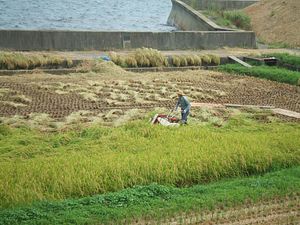On Friday, Japan and Taiwan signed off on five bilateral trade pacts just days after Taiwan voted in a referendum to uphold an import ban on agricultural products from areas surrounding the Fukushima nuclear fallout.
Last week, 7.8 million voters in Taiwan approved renewing a legally binding food ban that was originally imposed after the nuclear disaster in 2011. The ongoing agricultural ban covers five Japanese prefectures including Fukushima and nearby Gunma, Ibaraki, Tochigi, and Chiba over an extended two year period. Although the setback was expected to put a strain on bilateral relations, outright animosity has been diverted for now.
While there was no hiding the tension during two days of annual trade talks in Taipei, negotiations remained on cordial terms. In the absence of formal diplomatic representatives, leaders of the Taiwan-Japan Relations Association and Japan-Taiwan Exchange Association reached one agreement to speed up customs clearance on trade goods and four memorandums of understanding dealing with exchanges of patent information, business partnerships, medical equipment trade, and joint research.
Japanese Foreign Minister Taro Kono described the referendum results as “extremely disappointing” based on government efforts to provide food safety information and its continuous requests to lift the ban. Critics pointed out that the issue of Fukushima food safety was addressed on the referendum without any scientific backing. Kono said he was planning to retaliate by taking into consideration all available options as a future response. One tactic included advancing the World Trade Organization dispute settlement route and pushing efforts to persuade public opinion in Taiwan based on scientific data.
Although Taiwan’s President Tsai Ing-wen has called for closer exchanges between the two countries, she also stressed the need to respect the referendum as the embodiment of public opinion. Taiwan Foreign Ministry spokesperson Andrew Lee also responded saying they will handle the issue “carefully” and seek understanding from the Japanese side.
Taiwan has also been seeking to sign a full free trade agreement with Japan, the island’s third largest trading partner, but momentum to accelerate negotiations has stalled since the referendum. Taiwan’s lack of support in dispelling misinformation based on scientific inspection fueled criticisms in Japan that the food ban referendum was politically motivated by anti-Japanese feelings.
However, Taiwan isn’t the only government to regulate Fukushima imports behind the backdrop of radiation concerns. China, South Korea, Singapore, and Macau are among the neighbors imposing partial seafood and farm produce restrictions to varying degrees. Fukushima Governor Masao Uchibori acknowledged how rumors and hearsay overseas were making it difficult to eliminate import embargoes, but said progress on the safety of prefectural products can be seen from the number of countries easing restrictions. The number of countries limiting imports from the area has dropped from an initial 54 to 25.
A major breakthrough signaling regional attitudes are loosening up came with China’s announcement that they will begin to relax import restrictions on rice from Japan’s west coast Niigata prefecture. China suspended imports of all animal feed, agriculture and fisheries products after the Fukushima nuclear disaster in 2011. But after scientific evaluation, described as examining wind direction and distance from the damaged Fukushima nuclear reactor, Chinese President Xi Jinping cancelled import restrictions on the condition that white and brown rice are processed at milling factories registered with the Chinese Customs Authority.
Prime Minister Shinzo Abe’s efforts to persuade Xi to lift restrictions at the bilateral summit in October have paid off, symbolizing a warming of political ties.
Niigata is one of Japan’s flagship regions for rice production and there is growing demand for the staple food in China, which consumes 20 times more rice than Japan and amounts to 30 percent of the world market. Seven years after the ban was first imposed, its abolition unlocks the potential to expand exports within a market of wealthy consumers eager for high end Japanese rice.

































